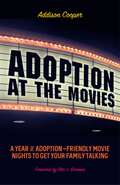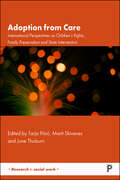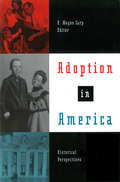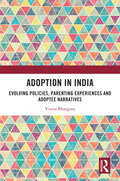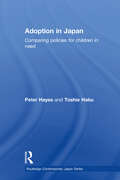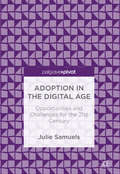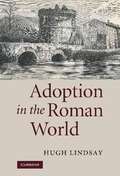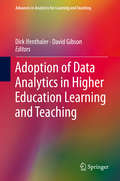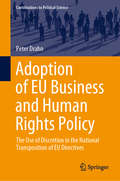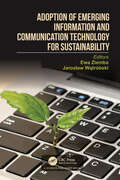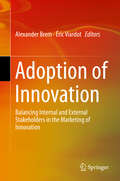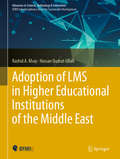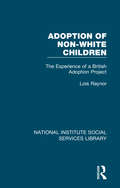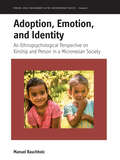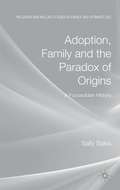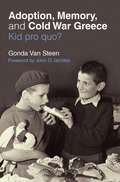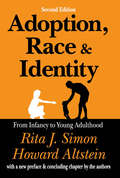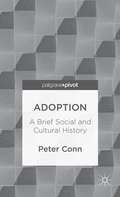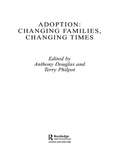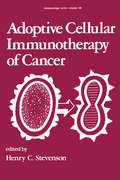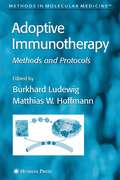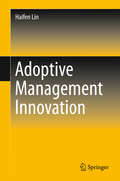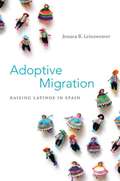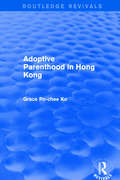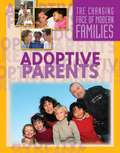- Table View
- List View
Adoption at the Movies: A Year of Adoption-Friendly Movie Nights to Get Your Family Talking
by Rita L. Soronen Addison CooperGet your family talking about adoption with the ultimate collection of films to help the whole family to explore their feelings in a fun and safe way. With a film for each week of the year, Addison Cooper has compiled the best movies, new and old, for family-friendly viewing. Among those featured are Finding Dory, Frozen, Paddington, Teenage Mutant Ninja Turtles, Kung Fu Panda, Star Wars, Divergent, The Blind Side and I am Sam. Carefully selected, the movies included will help families to comfortably talk about important adoption-related topics. They are accompanied by descriptions of the themes and ideas to get the conversations started. Helping all members of the family to explore both the pain and joy of adoption, they cover a range of issues which can arise such as culture, identity, control, and reunification. With something for everyone - from kids, to teens, to grown-ups - this is a must-have for all adoptive families.
Adoption from Care: International Perspectives on Children’s Rights, Family Preservation and State Intervention (Research in Social Work)
by Tarja Pösö, Marit Skivenes and June ThoburnEPDF and EPUB available Open Access under CC-BY-NC-ND. This book explores how children’s rights are practised and weighed against birth and adoptive parents’ rights and examines how governments and professionals balance rights when it is decided that children cannot return to parental care. From different socio-political and legal contexts in Europe and the United States, it provides an in-depth analysis of concepts of family, contact, the child’s best-interest principle and human rights when children are adopted from care. Taking an international comparative approach to these issues, this book provides detailed information on adoption processes and shares learning from best practice and research across country boundaries to help improve outcomes for all children in care for whom adoption may be the placement of choice.
Adoption in America
by E. Wayne Carp"Includes research on adoption documents rarely open to historians . . . an important addition to the literature on adoption. " ---Choice "Sheds new light on the roots of this complex and fascinating institution. " ---Library Journal "Well-written and accessible . . . showcases the wide-ranging scholarship underway on the history of adoption. " ---Adoptive Families "[T]his volume is a significant contribution to the literature and can serve as a catalyst for further research. " ---Social Service Review Adoption affects an estimated 60 percent of Americans, but despite its pervasiveness, this social institution has been little examined and poorly understood. Adoption in Americagathers essays on the history of adoptions and orphanages in the United States. Offering provocative interpretations of a variety of issues, including antebellum adoption and orphanages; changing conceptions of adoption in late-nineteenth-century novels; Progressive Era reform and adoptive mothers; the politics of "matching" adoptive parents with children; the radical effect of World War II on adoption practices; religion and the reform of adoption; and the construction of birth mother and adoptee identities, the essays inAdoption in Americawill be debated for many years to come.
Adoption in India: Evolving Policies, Parenting Experiences and Adoptee Narratives
by Vinita BhargavaThis book highlights the complexities and multi-dimensionalities of child adoption in India by challenging the prevalent adoption theories. It is the only book to lend a voice to adopted children and adults. It foregrounds the narratives of many families in their experiences of adoption together with the author's personal account as an adoptive parent.The volume outlines parenting practices that lead to success and well-being achieved through adoption. The first unit deals with the 'macro' delineation of child adoption, while the second discusses the 'micro' concerns of parents and children in the Indian context. It also analyses the socio-political and socio-cultural contexts within which adoptions take place. It includes excerpts from the guidelines for in-country adoption, the Juvenile Justice Act and the Hague Convention on inter-country adoptions.This book would be useful to the students, researchers, and faculty of Social Work, Human Development, Education, Psychology, Sociology and Law. It will also be an indispensable companion to adoptive parents (domestic and inter-country), adoptees (domestic and abroad), psychologists, therapists, psychiatrists, and policy makers.
Adoption in Japan: Comparing Policies for Children in Need (Routledge Contemporary Japan Series #Vol. 9)
by Peter Hayes Toshie HabuThe first book-length study of adoption in Japan, this impressive work tackles the innovative and sometimes controversial subject of the policies of adoption agencies in Japan. The book places special adoption in the context of a liberal reformist agenda that has challenged traditional concepts of the family through the efforts to place children with difficult family backgrounds, including mixed and minority ethnic backgrounds. Drawing on empirical source material gathered since the late 1980s, the authors consider the central policy issue of whether agencies should be given a free hand to create their own policies, or whether they should be more tightly regulated. Finally, the book analyzes how different agency strategies for finding homes for hard to place children are related to different assumptions about the psychology and reasoning of prospective parents. Adoption in Japan makes a significant contribution to the academic literature in the fields of Japanese studies, public policy, social work and sociology. It will also be of interest to professionals involved in adoption agencies, specialist social work and adoption panels.
Adoption in the Digital Age: Opportunities and Challenges for the 21st Century
by Julie SamuelsAdoption in the Digital Age explores the transformation of adoption due to social and digital media technologies. The most prolific of these changes can be seen within contact arrangements, particularly those that are not managed by an intermediary, between adopted minors and their biological kin. Within this shift, it becomes clear that this often-breached contact arrangement lends itself towards discussions about further openness within adoption. At the same time these technologies continue to document the way adopted individuals and their biological kin feel about themselves and each other. It is for these reasons that the Internet remains both a promise and threat. Samuels explores this in detail, highlighting that what it means to be adopted continues to evolve in the context of networked media cultures. <P><P> Combining both theoretical discussions with the human experience of adoption, Adoption in the Digital Age will be of interest to students and scholars across a range of disciplines, including sociology, social work and cultural studies, as well as practitioners working with adoptive families and other members of the adoption triad connected and disconnected by adoption.
Adoption in the Roman World
by Hugh LindsayAdoption in other cultures and other times provides a background to understanding the operation of adoption in the Roman worlds. This book considers the relationship of adoption to kinship structures in the Greek and Roman world. It considers the procedures for adoption followed by a separate analysis of testamentary cases, and the impact of adoption on nomenclature. The impact of adoption on inheritance arrangements is considered, including an account of how the families of freedmen were affected. Its use as a mode of succession at Rome is detailed, and this helps to understand the anxiety of childless Romans to procure a son through adoption, rather than simply to nominate heirs in their wills. The strategy also had political uses, and importantly it was used to rearrange natural succession in the imperial family. The book concludes with political adoptions, looking at the detailed case studies of Clodius and Octavian.
Adoption of Data Analytics in Higher Education Learning and Teaching (Advances in Analytics for Learning and Teaching)
by David Gibson Dirk IfenthalerThe book aims to advance global knowledge and practice in applying data science to transform higher education learning and teaching to improve personalization, access and effectiveness of education for all. Currently, higher education institutions and involved stakeholders can derive multiple benefits from educational data mining and learning analytics by using different data analytics strategies to produce summative, real-time, and predictive or prescriptive insights and recommendations. Educational data mining refers to the process of extracting useful information out of a large collection of complex educational datasets while learning analytics emphasizes insights and responses to real-time learning processes based on educational information from digital learning environments, administrative systems, and social platforms. This volume provides insight into the emerging paradigms, frameworks, methods and processes of managing change to better facilitate organizational transformation toward implementation of educational data mining and learning analytics. It features current research exploring the (a) theoretical foundation and empirical evidence of the adoption of learning analytics, (b) technological infrastructure and staff capabilities required, as well as (c) case studies that describe current practices and experiences in the use of data analytics in higher education.
Adoption of EU Business and Human Rights Policy: The Use of Discretion in the National Transposition of EU Directives (Contributions to Political Science)
by Peter DrahnThis book explores how and why the transposition of EU directives in the new and contentious policy area ‘Business and Human Rights’ differs between member states. It reveals the extent to which individual member states are pursuing diverging approaches in dealing with the ‘discretionary space’ in EU directives, and highlights theoretical and political explanations. Drawing on historical institutionalism and rational choice institutionalism, the book establishes a link between the degree of corporatism in a given political economy and government behaviour in terms of Business and Human Rights policy. Moreover, it identifies political salience within the policy subsystem as a pertinent factor for explaining national transposition outcomes.
Adoption of Emerging Information and Communication Technology for Sustainability
by Ewa Ziemba JarosławThis book represents an important voice in the discourse on the adoption of emerging ICT for sustainability. It focuses on how emerging ICT acts as a crucial enabler of sustainability, offering new forward-looking approaches to this field. The book explores how emerging ICT adoption drives sustainability efforts in business and public organizations, promoting ecological, economic, social, cultural, and political sustainability. The book's theoretical discussions, conceptual approaches, empirical studies, diverse perspectives, and views make it a valuable and comprehensive reference work. Appealing to both researchers and practitioners, this book provides significant areas for research and practice related to the contribution of emerging ICT adoption to sustainability. It also suggests vital considerations for programming and building sustainable development-driven emerging ICT adoption. Readers will find answers to important contemporary questions, such as: What are the concepts, frameworks, models, and approaches to enhance sustainable development through the adoption of emerging ICT? How does the adoption of emerging ICT influence sustainability? How can emerging ICT be adopted to enhance sustainability? What are the current practices and successful cases of emerging ICT adoption for sustainability? What factors influence emerging ICT adoption to enhance sustainability?
Adoption of Innovation: Balancing Internal and External Stakeholders in the Marketing of Innovation
by Alexander Brem Éric ViardotThis edited volume brings together academics from both innovation and marketing fields to explore the additional value for companies that can be generated with the innovations in marketing and the marketing of innovations. If ideas need to reach the marketplace, then marketing strategies, concepts and tools - such as the continuous development of new product and services - become vital for their success. On the other hand, marketing management is influenced by innovation as illustrated by the way social media and Internet have revolutionized the traditional marketing-mix. Such linkages between innovation and marketing research need to be much stronger as companies have to convince internal and external stakeholders to achieve successful innovation strategies. State-of-the-art research output from different perspectives would suit the needs of a researcher as well as the company CEO alike.
Adoption of LMS in Higher Educational Institutions of the Middle East (Advances in Science, Technology & Innovation)
by Hassan Qudrat-Ullah Rashid A. KhanThis book discusses the adoption of learning management systems (LMS) in higher education institutions. It presents influential predictors that may impact instructors’ behavioral intention to adopt learning management systems in the context of Arab culture, as well as a unique model of technology acceptance that draws on and combines previous technology adoption models (i.e., a modified unified theory of acceptance and use of technology model – UTAUT2). Moreover, this study extends the UTAUT2 model by including Hofstede’s (1980) cultural dimensions, and technology awareness as the moderators of the model. It also describes the explanatory technique approach used to collect quantitative data from the instructors at higher education institutions in Saudi Arabia and were analyzed with structural equation modeling using SPSS/Amos software. The findings revealed that facilitating conditions were the strongest predictor of behavioral intention to adopt an LMS, followed by performance expectancy and hedonic motivation, technology awareness, and cultural dimensions exerted a moderating influence on instructors’ behavioral intention to use LMS in their teaching. By including new constructs, this becomes the first study of its kind exploring instructors’ use of LMS in Higher Educational Institutions of Saudi Arabia and other countries of the Middle East. It offers practical insights for a broad range of researchers and professionals at higher education institutions and serves as a reference guide for designers of learning management systems (e.g., blackboard systems), policymakers, and the Ministry of Education staff.
Adoption of Non-White Children: The Experience of a British Adoption Project (National Institute Social Services Library)
by Lois RaynorCan adoptive homes be found for non-white children? Will the children and their new families be happy together though of different race? Will they feel like a family? Originally published in 1970, this book is an account of a four-year project in which International Social Service of Great Britain joined with Bedford College, London University, to provide a first-class adoption service for babies born in Britain of diverse racial origins, and to study the outcome of the adoptions. In addition, a survey sought to determine the number of these children needing adoption homes, and a nationwide Adoption Resource Exchange was established to co-ordinate the efforts of the numerous agencies seeking parents for them. The author examines the project’s experience of interracial adoption and relates it to all good adoption practice. This title was a welcome addition to the literature on adoption at the time. It would have been indispensable to social work practitioners and to students and lecturers on social work courses, but it was more than a handbook for those professionally involved. The book is well-informed and written with style and compassion: many readers will be fascinated by the way in which children of Asian, African, West-Indian and mixed parentage became integrated into English families in spite of racial differences. It is a success story. Today it can be read in its historical context. This book is a re-issue originally published in 1970. The language used is a reflection of its era and no offence is meant by the Publishers to any reader by this re-publication.
Adoption, Emotion, and Identity: An Ethnopsychological Perspective on Kinship and Person in a Micronesian Society (Person, Space and Memory in the Contemporary Pacific #8)
by Manuel RauchholzExploring adoption in the Pacific, this book goes beyond the commonplace structural-functional analysis of adoption as a positive “transaction in parenthood.” It examines the effects it has on adoptees’ inner sense of self, their conflicted emotional lives, and familial relationships that are affected by a personal sense of rejection and not belonging. This account is theoretically rooted in ethnopsychology, based on field work conducted across multiple research sites in the Chuuk Lagoon, its neighboring Chuukic-speaking atolls, and persons from neighboring Micronesian island communities.
Adoption, Family and the Paradox of Origins
by Sally SalesIt is now over 20 years since 'open adoption' was first introduced, but it remains a controversial and contested part of social work practice. This innovative and far ranging book sets out to understand why the practice of keeping adopted children in touch with their kinship origins is still so questioned in contemporary adoption work. Written by an experienced practitioner in the field, this book applies, for the first time, Foucauldian methodology to analyze and understand adoption social work, making it essential reading for a wide audience in the social sciences.
Adoption, Memory, and Cold War Greece: Kid pro quo?
by Gonda Van SteenThis book presents a committed quest to unravel and document the postwar adoption networks that placed more than 3,000 Greek children in the United States, in a movement accelerated by the aftermath of the Greek Civil War and by the new conditions of the global Cold War. Greek-to-American adoptions and, regrettably, also their transactions and transgressions, provided the blueprint for the first large-scale international adoptions, well before these became a mass phenomenon typically associated with Asian children. The story of these Greek postwar and Cold War adoptions, whose procedures ranged from legal to highly irregular, has never been told or analyzed before. Adoption, Memory, and Cold War Greece answers the important questions: How did these adoptions from Greece happen? Was there any money involved? Humanitarian rescue or kid pro quo? Or both? With sympathy and perseverance, Gonda Van Steen has filled a decades-long gap in our understanding, and provided essential information to the hundreds of adoptees and their descendants whose lives are still affected today.
Adoption, Race, and Identity: From Infancy to Young Adulthood
by Rita SimonAdoption, Race, and Identity is a long-range study of the impact of interracial adoption on those adopted and their families. Initiated in 1972, it was continued in 1979, 1984, and 1991. Cumulatively, these four phases trace the subjects from early childhood into young adulthood. This is the only extended study of this controversial subject.Simon and Altstein provide a broad perspective of the impact of transracial adoption and include profiles of the families involved in the study. They explore and compare the experiences of both the parents and the children. They identify families whose adoption experiences were problematic and those whose experiences were positive. Finally, the study looks at the insights the experience of transracial adoption brought to the adoptive parents and what advice they would pass on to future parents adopting children from different racial backgrounds. They include the reflections of those adopted included in the 1972 first phase, who are now adults themselves.This second edition includes a new concluding chapter that updates the fourth and last phase of the study. The authors were able to locate 88 of the 96 families who participated in the 1984 study. Bringing together all four phases of this twenty-year study into one volume gives the reader a richer and deeper understanding of what the experience of transracial adoption has meant for the parents, the adoptees, and children born into the families studied. This landmark work, will be of compelling interest to social workers, policy makers, and professionals and families involved on all sides of interracial adoption.
Adoption: A Brief Social and Cultural History
by Peter ConnCombining advocacy and memoir with social and cultural history, this book offers a comparative, cross-cultural survey of the whole history of adoption that is grounded in the author's personal experience.
Adoption: Changing Families, Changing Times
by Terry Philpot Anthony DouglasAdoption: Changing Families, Changing Times draws together contributions from all those with an interest in adoption: adopted people; birth parents and adoptive parents; practitioners and managers in the statutory and voluntary sectors; academics and policy makers. Chapters on research and policy are interspersed with those from people with first-hand experience of being adopted, becoming an adoptive parent or giving a child up for adoption. Together, they provide unique insights into a subject that although regularly in the media is often surrounded by prejudice and misconception. Topics covered include:* children and young people in care* trying to adopt* waiting for adoption* life after adoption* the politics of adoption.This accessible text offers a comprehensive view of adoption policy, practice and services and analyses why adoption has become so controversial. It provides professional and general reader alike with a fully rounded picture of adoption and exposes some of the myths surrounding it.
Adoptive Cellular Immunotherapy of Cancer
by H. C. StevensonThis volume presents the most complicated and powerful cancer biotherapies developed. It provides an overview of human immune system function and the mechanisms by which adoptive cellular immunotherapies (ACI) harnesses the activity. The volume provides a vision on the developments in ACI.
Adoptive Immunotherapy: Methods and Protocols (Methods in Molecular Medicine #109)
by Matthias W. Hoffmann Burkhard LudewigAn authoritative collection of optimal techniques for producing and characterizing the immunologically active cells and effector molecules now gaining wide use in the clinical treatment of patients. Taking advantage of the latest technologies, the authors present readily reproducible experimental protocols for the study of dendritic cells, T cells, monoclonal antibodies, and bone marrow transplantation. The emphasis is on preclinicical and clinical applications and on the progress of selected approaches in clinical trials. Additional chapters cover the molecular definition of target antigens, mathematical modeling approaches to immunotherapy, and the utilization of regulatory T cells. The protocols make it possible to study the adoptive transfer of tailored antigen-specific immune cells and to improve the clinical application of adoptive immunotherapy.
Adoptive Management Innovation
by Haifen LinThis book discusses adoptive management innovation, which has been successfully implemented in other areas. It proposes a theory on this field by considering the importance and popularity of adoptive management innovation in China and around the globe, and focusing on its nature. It also establishes a process framework through which adoptive management innovation occurs, explores how individual characteristics of individual managers affect their adoption decision, examines the effects of a firm’s dynamic capability on each phase of adoptive innovation, and addresses how intangible management innovation supports the process of tangible product innovation to produce effects. By exploring the process, adoption decision, drivers and effects of adoptive management innovation, the book offers abundant applications for managerial practice
Adoptive Migration: Raising Latinos in Spain
by Jessaca B. LeinaweaverSpain has one of the highest per capita international adoption rates in the world. Internationally adopted kids are coming from many of the same countries as do the many immigrants who are radically transforming Spain's demographics. Based on interviews with adoptive families, migrant families, and adoption professionals, Jessaca B. Leinaweaver examines the experiences of Latin American children adopted into a rapidly multiculturalizing society. She focuses on Peruvian adoptees and immigrants in Madrid, but her conclusions apply more broadly, to any pairing of adoptees and migrants from the same country. Leinaweaver finds that international adoption, particularly in a context of high rates of transnational migration, is best understood as both a privileged and unusual form of migration, and a crucial and contested method of family formation. Adoptive Migration is a fascinating study of the implications for adopted children of growing up in a country that discriminates against their fellow immigrants.
Adoptive Parenthood in Hong Kong (Routledge Revivals Ser.)
by Grace Po-Chee KoThis title was first published in 2001. A systematic study of non-relative adoption in Hong Kong. It examines the changing profile of non-relative adoption between 1987 and 1993, from the author's analysis of 486 case files. Characteristics of the adoptive parents, adopted children and their birth parents are presented in descriptive statistics. Three predictors of adoption stresses are identified. Adjustment in adoption and threat to parental entitlement were positively related to adoption stress; parental education was negatively related to it. Apart from being more stressful, Chinese adopters were found to be significantly different from non-Chinese for having a lower level of acknowledgement of difference. They are more worrisome over the relationship with birth parents, are less ready to reveal adoption, have better adoptive parent-child relationship, and possess higher levels of personal qualities. The findings of the study suggest that a post-legal adoption service is urgently needed.
Adoptive Parents
by Rae SimonsSome couples can't have children, for a variety of reasons. Meanwhile, too many children don't have families of their own to love and care for them. When these couples reach out to adopt these children, new families are formed-and like all families, they have a whole set of issues and complications, some of them unique to their situation. Raising any child has challenges, and raising an adopted child has some extra ones. What about birth families? Are they going to be a part of the child's life? What do you tell the child about his birth and adoption? The families in this book have all had their own struggles and complications they've had to deal with, but they've had many joys as well and learned a lot through their experiences.
